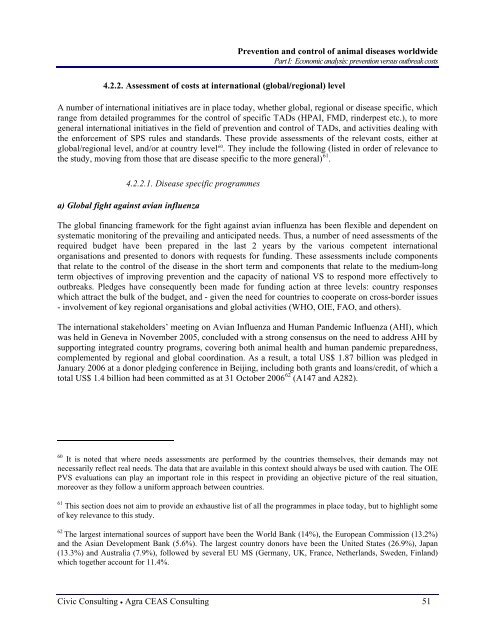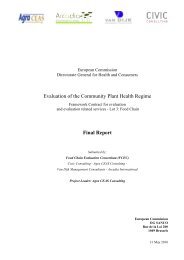2294 part 1 final report.pdf - Agra CEAS Consulting
2294 part 1 final report.pdf - Agra CEAS Consulting
2294 part 1 final report.pdf - Agra CEAS Consulting
You also want an ePaper? Increase the reach of your titles
YUMPU automatically turns print PDFs into web optimized ePapers that Google loves.
Prevention and control of animal diseases worldwide<br />
Part I: Economic analysis: prevention versus outbreak costs<br />
4.2.2. Assessment of costs at international (global/regional) level<br />
A number of international initiatives are in place today, whether global, regional or disease specific, which<br />
range from detailed programmes for the control of specific TADs (HPAI, FMD, rinderpest etc.), to more<br />
general international initiatives in the field of prevention and control of TADs, and activities dealing with<br />
the enforcement of SPS rules and standards. These provide assessments of the relevant costs, either at<br />
global/regional level, and/or at country level 60 . They include the following (listed in order of relevance to<br />
the study, moving from those that are disease specific to the more general) 61 .<br />
4.2.2.1. Disease specific programmes<br />
a) Global fight against avian influenza<br />
The global financing framework for the fight against avian influenza has been flexible and dependent on<br />
systematic monitoring of the prevailing and anticipated needs. Thus, a number of need assessments of the<br />
required budget have been prepared in the last 2 years by the various competent international<br />
organisations and presented to donors with requests for funding. These assessments include components<br />
that relate to the control of the disease in the short term and components that relate to the medium-long<br />
term objectives of improving prevention and the capacity of national VS to respond more effectively to<br />
outbreaks. Pledges have consequently been made for funding action at three levels: country responses<br />
which attract the bulk of the budget, and - given the need for countries to cooperate on cross-border issues<br />
- involvement of key regional organisations and global activities (WHO, OIE, FAO, and others).<br />
The international stakeholders’ meeting on Avian Influenza and Human Pandemic Influenza (AHI), which<br />
was held in Geneva in November 2005, concluded with a strong consensus on the need to address AHI by<br />
supporting integrated country programs, covering both animal health and human pandemic preparedness,<br />
complemented by regional and global coordination. As a result, a total US$ 1.87 billion was pledged in<br />
January 2006 at a donor pledging conference in Beijing, including both grants and loans/credit, of which a<br />
total US$ 1.4 billion had been committed as at 31 October 2006 62 (A147 and A282).<br />
60 It is noted that where needs assessments are performed by the countries themselves, their demands may not<br />
necessarily reflect real needs. The data that are available in this context should always be used with caution. The OIE<br />
PVS evaluations can play an important role in this respect in providing an objective picture of the real situation,<br />
moreover as they follow a uniform approach between countries.<br />
61 This section does not aim to provide an exhaustive list of all the programmes in place today, but to highlight some<br />
of key relevance to this study.<br />
62<br />
The largest international sources of support have been the World Bank (14%), the European Commission (13.2%)<br />
and the Asian Development Bank (5.6%). The largest country donors have been the United States (26.9%), Japan<br />
(13.3%) and Australia (7.9%), followed by several EU MS (Germany, UK, France, Netherlands, Sweden, Finland)<br />
which together account for 11.4%.<br />
Civic <strong>Consulting</strong> • <strong>Agra</strong> <strong>CEAS</strong> <strong>Consulting</strong> 51













